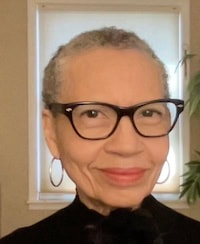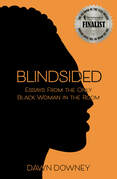When my mind reaches for the memory of Dr. Agnes Jackson, it closes around empty space. Agnes aches like a missing limb.
I’m ashamed of not remembering her, because my oldest friend from college is reverential when she speaks of Dr. Jackson. Yolanda’s comments are intertwined with intimate details about me. “You never missed Agnes’s class … Agnes really challenged you … Agnes said you were a writer.”
I ache for Dr. Agnes Jackson because she saw me at a time when I was invisible to myself. I ache for her because she died before I understood her memory mattered. Before I could thank her.
I ache for the young woman whose potential she nurtured.
Dr. Jackson arrived at the Claremont Colleges the same year I did. I matriculated to Pomona, and she was was hired as the first tenure-track Arican American professor at Pitzer, both of us products of Affirmative Action. Dr. Agnes Jackson created the Black Studies and Womens Studies departments.
I dissociated.
A failure of episodic memory, dissociative amnesia is related to childhood trauma—the grocery list of assaults on our innocence that little ones survive as best we can.
The college years did not make it into my conscious mind. If I cobble together Yolanda’s memory and my yearning, I’ll find myself as well as Dr. Jackson.
I find an image of her online, dated 1974. The professor’s face is studious under an Afro like the one I wore in the ’70s. She’s sitting in a living room, among girls wearing clothes I would have worn. I imagine any mentor of mine would have had soft kind eyes; hers look stern. I wait in vain for a twinge of recognition.
I’m jealous of those girls. They have memories that should be mine. I trim them out of the photo, print it, and set it on the desk beside my laptop.
Pomona College research habits lead me to websites for Psychology Today, The National Institutes of Health, The Mayo Clinic, and The American Psychiatric Association. They point in the same direction. My memories can be recovered.
My jaw drops, and I put my hand over my wide-open mouth, holding on to the happy surprise.
Research reveals hypnotherapy is effective. I schedule three sessions.
I quiz Yolanda. We took Dr. Jackson’s class when we were sophomores or juniors. My sophomore year is the only year I smiled. There were parties in our dorm every weekend, and I loved to dance. Yo asks, “Remember the hot pants party?” I do, I do!
My memory circles Dr. Jackson.
More research indicates a direct connection between music and memory.
I Google soul music 1971. It’s a gold mine. Billboard calls 1971 a brilliant year in R&B. James Brown’s “Hot Pants (Parts 1, 2, and 3)” pops up. Of course we had a hot pants party. (three parts! god, we must have been sweaty.) As the list unscrolls on my phone, I bounce to familiar rhythms and sing half forgotten phrases. Aretha, “Spanish Harlem.” Marvin Gaye, “What’s Going On?” Jackson Five, “Never Can Say Goodbye.” Temptations “Just My Imagination.” Chi-Lites “Have You Seen Her?” I immediately download them and create a playlist: “1971.”
I slip a copy of Dr. Jackson’s photo under my pillow. Maybe she’ll come to me in a dream.
I don’t understand this quest, but my energy opens to the possibility of putting myself back together. Intuition says follow the research. Trust the science.
Still, I ask The Temptations, “Is it just my imagination?”
I’m ashamed of not remembering her, because my oldest friend from college is reverential when she speaks of Dr. Jackson. Yolanda’s comments are intertwined with intimate details about me. “You never missed Agnes’s class … Agnes really challenged you … Agnes said you were a writer.”
I ache for Dr. Agnes Jackson because she saw me at a time when I was invisible to myself. I ache for her because she died before I understood her memory mattered. Before I could thank her.
I ache for the young woman whose potential she nurtured.
Dr. Jackson arrived at the Claremont Colleges the same year I did. I matriculated to Pomona, and she was was hired as the first tenure-track Arican American professor at Pitzer, both of us products of Affirmative Action. Dr. Agnes Jackson created the Black Studies and Womens Studies departments.
I dissociated.
A failure of episodic memory, dissociative amnesia is related to childhood trauma—the grocery list of assaults on our innocence that little ones survive as best we can.
The college years did not make it into my conscious mind. If I cobble together Yolanda’s memory and my yearning, I’ll find myself as well as Dr. Jackson.
I find an image of her online, dated 1974. The professor’s face is studious under an Afro like the one I wore in the ’70s. She’s sitting in a living room, among girls wearing clothes I would have worn. I imagine any mentor of mine would have had soft kind eyes; hers look stern. I wait in vain for a twinge of recognition.
I’m jealous of those girls. They have memories that should be mine. I trim them out of the photo, print it, and set it on the desk beside my laptop.
Pomona College research habits lead me to websites for Psychology Today, The National Institutes of Health, The Mayo Clinic, and The American Psychiatric Association. They point in the same direction. My memories can be recovered.
My jaw drops, and I put my hand over my wide-open mouth, holding on to the happy surprise.
Research reveals hypnotherapy is effective. I schedule three sessions.
I quiz Yolanda. We took Dr. Jackson’s class when we were sophomores or juniors. My sophomore year is the only year I smiled. There were parties in our dorm every weekend, and I loved to dance. Yo asks, “Remember the hot pants party?” I do, I do!
My memory circles Dr. Jackson.
More research indicates a direct connection between music and memory.
I Google soul music 1971. It’s a gold mine. Billboard calls 1971 a brilliant year in R&B. James Brown’s “Hot Pants (Parts 1, 2, and 3)” pops up. Of course we had a hot pants party. (three parts! god, we must have been sweaty.) As the list unscrolls on my phone, I bounce to familiar rhythms and sing half forgotten phrases. Aretha, “Spanish Harlem.” Marvin Gaye, “What’s Going On?” Jackson Five, “Never Can Say Goodbye.” Temptations “Just My Imagination.” Chi-Lites “Have You Seen Her?” I immediately download them and create a playlist: “1971.”
I slip a copy of Dr. Jackson’s photo under my pillow. Maybe she’ll come to me in a dream.
I don’t understand this quest, but my energy opens to the possibility of putting myself back together. Intuition says follow the research. Trust the science.
Still, I ask The Temptations, “Is it just my imagination?”







 RSS Feed
RSS Feed